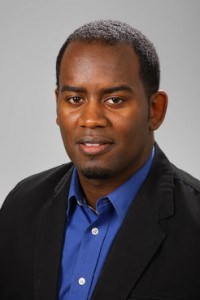Charles T. Brown, MPA, CPD, LCI, senior researcher and adjunct professor at the Bloustein School’s Alan M. Voorhees Transportation Center, has been selected as one of 20 inaugural fellows of the Public Voices Fellowship on the Climate Crisis, a partnership of the Yale Program on Climate Change Communication and The OpEd Project.
According to the announcement, the Fellowship is part of The OpEd Project’s national Public Voices initiative to change who writes history. It is also part of YPCCC’s work to diversify and amplify the voices working to build public and political will for climate change action.
“Just as we are seeing now with COVID-19, the climate crisis affects all of us, but its impacts are unevenly and unjustly distributed. Those with the greatest power to mitigate and adapt to climate change often have the least incentive to do so, across geography, wealth, age, race, and gender,” according to the announcement. “We need better and faster ideas from more diverse individuals across these divides, including those most affected by climate impacts, who are able to see new solutions and envision a more just future.”
The fellows were selected from more than 650 extraordinary, energetic, and talented applicants, making selection extremely competitive and challenging and demonstrate high-powered thought leadership in a variety of ways including community organizing, film, public speaking, and public writing. Several bring decades of experience shaping global and domestic climate policy, driving the transition to clean, renewable energy, or articulating the connections between climate change and human health. Some are shaping the political voice of a new generation, engaging faith communities to address climate change, or amplifying the voices of vulnerable, historically underrepresented populations. Others are championing new approaches to achieve equity in transportation, energy, and other sectors while also reducing carbon pollution. They all seek solutions.

A self-proclaimed “street-level researcher,” Charles Brown works at the intersection of transportation, health, and equity. As one of the nation’s leading thought leaders, he has spent his entire career committed to the fight for more equitable, inclusive, and livable communities in the U.S. and abroad. As a survivor of both Hurricane Katrina and Hurricane Sandy, he understands firsthand the importance of increasing access to public transportation and building more safe and convenient spaces for people to bike, walk, roll and “e-scoot” to improve their overall health and wellbeing.
His background includes more than a decade’s public and private sector experience in urban and regional planning, public policy, and research. He has led community outreach and engagement involving public agencies, for-profits, and non-profit organizations across the U.S. and abroad. Charles has developed and taught courses on introductory and advanced environmental justice (EJ), equity, vision zero, and complete streets for the National Transit Institute, Federal Transit Administration, Federal Highway Administration, Centers for Disease Control and Prevention (CDC), and New Jersey Department of Transportation.
An active member of the Transportation Research Board (TRB) Pedestrian Safety Committee and Bicycle Transportation Committee, his work has been published in several journals and featured in the New York Times, CityLab and other national and local media outlets. He has been the recipient of several notable honors in transportation and receives invitations to speak locally, nationally, and internationally. He is also a military veteran and a recipient of the Mississippi Commendation Medal and Global War on Terrorism Service Medal.
